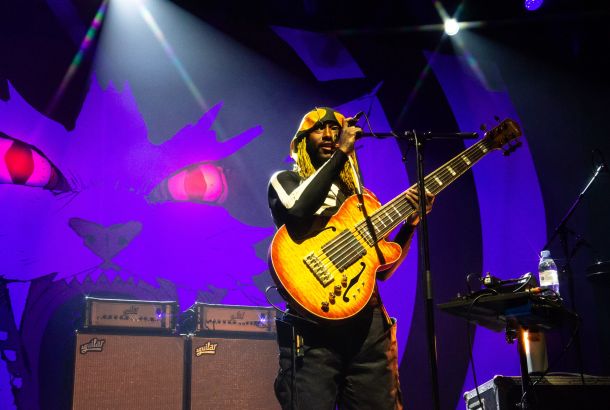Interview: Pokey Lafarge
By Jamie Bulman
You may have seen Pokey Lafarge’s set on Jools Holland’s NYE Hootenanny a couple of years ago, or on David Letterman. He has caused waves in the world of contemporary Americana with his progressive and unique blend of American roots musics. His music links archaic styles such as Polka, Calypso, Ragtime, Country blues and Appalachian folk with early Jazz, to create a theatrical performance which transports his audience into another era. He is supported by a five-piece band of virtuosic multi-instrumentalists playing antiquated instruments such as the washboard and kazoo, alongside brilliant brass and wind players. I picked Pokey’s brain about revivalism and the peculiar quality of the old, as he picked at Southern fried chicken in the green room of Manchester’s Gorilla before the evening’s show.
This dynamic character looks like he has just stepped out of a smoky 1930’s Jazz club, rarely appearing without a 3-piece suit and tie. On stage he plays the role of both musician and entertainer, and his caberet-esque jests with the crowd at Gorilla embued the modern venue with the swinging vibes of a speakeasy. “I’ve always liked music that has a lot of character. I wanted a bouncy feel, and jazz goes along with all of that” Pokey tells me. With the addition of the wind and brass for Pokey’s latest eponymous album, the music takes on a more playfully jazzy feel. “Being a bandleader and a songwriter will entail a certain amount of ambition and vision, of course. The fact is I’ve been wanting to play with a bigger band ever since I started making music, it’s just more colours to paint with.”
Conversation strayed to the marginalization of ‘old’ and authentic ‘folk’ musics in preference of contemporary styles at European festivals these days. “We played some big festivals this summer, and we’ve been getting great exposure and exposing people to music they would never otherwise hear” Pokey explains. “I think it’s refreshing for them, especially when you go to these festivals and you’re just hearing guys with laptops. It’s so often like a wall of sound geared behind a singer and a product, and not always necessarily rooted, sincere and honest expression.”
“You hear me play, you know I’m from America” Pokey offers. He is proud of America’s rich musical heritage, which stems from the cultural melting pot that emerged as settlers from Europe brought their own music that over time merged with the native musics of slaves from Africa. A prime example of this was the introduction of the guitar, brought to America by Spanish immigrants, to African folk songs to form the key ingredient in ‘the blues’. The echoes of this fusion can be heard in almost all contemporary music. “You’re not going to hear a lot of West African music, or calypso or Latin music at festivals these days” Pokey muses, “because of course in the Western world, in the most sincerely humble way, American music does reign supreme. Thankfully I think there’s a reason for that.”
I quizzed Pokey about his formal dress and the old-fashioned style of both his clothing and his music. “Some things just happen to have been unfortunately popular in the past, for example a higher standard of dress and appearance. To me it just seems like common sense. It’s a manner, and a matter of having respect for yourself and the people around you.” Pokey is more interested in heritage and history than vintage: “people are concerned with where their food comes from, and it’s the same with music and dress. Is that a vintage thing? Fuck no. It’s just common sense.”
Despite using old styles of language and standard folk and blues references, songs such as ‘Close The Door’ from his latest self-titled album take a contemporary political stance, in this case critiquing the privatised health service in the States. Pokey doesn’t want ‘to confuse anybody: “Lyrics should paint a picture that people can understand. I have things that I want to say, I want it to be like a conversation.”
The gig at Gorilla was a real tour de force of instrumental prowess and rebellious authenticity in an age that has marginalised ragtime and swing music. But Pokey Lafarge and his shoestring band don’t just give the music a new lease of life. Speaking to Pokey truly was like stepping into a time machine. He profoundly embodies the style and values of a simpler time, and is truly devoted to bringing old music to new ears. American depression-era music has never felt fresher; I recommend you check it out!







